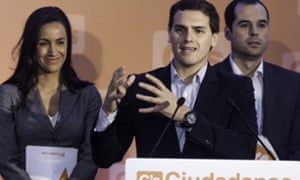ttp://www.theguardian.com/world/2015/mar/13/ciudadanos-podemos-of-right-political-force-spain-albert-rivera?utm_source=Active+Subscribers&utm_campaign=1305fb5401-MR_031315&utm_medium=email&utm_term=0_35c49cbd51-1305fb5401-64063349
Ciudadanos, the 'Podemos of the right', emerges as political force in Spain
Albert Rivera’s pro-EU movement is gaining ground among voters disillusioned by corruption claims surrounding ruling People’s party
But it isn’t Podemos.
 |
| Albert Rivera’s pro-EU movement is gaining ground among voters disillusioned by corruption claims surrounding ruling People’s party |
Staunchly opposed to Catalan separatism and deeply committed to the EU, Ciudadanos recently announced that after nine years in Catalan politics it would field candidates across the country for upcoming municipal, regional and general elections. It swiftly climbed in the polls and now sits neck and neck with Podemos, the governing People’s party and the opposition Socialists.
'Yes he can!' How Spanish indignado Pablo Iglesias aims to use a wave of protest to build 'a decent country'
Read more
While Podemos has attracted left-leaning voters disenchanted with the country’s dominant parties in the wake of the economic crisis, Ciudadanos is being seen by many as a right-leaning option. In particular, it has wooed voters disgusted by the rampant allegations of corruption facing the People’s party.
Last month, supporters queued around the block in central Madrid to hear the party launch its economic platform, which includes promises of tax credits for workers who earn less than the minimum salary, incentives to encourage employers to refrain from redundancies and a labour reform to curtail the growing use of temporary contracts.
Just as Podemos’s Pablo Iglesias sports a ponytail and jeans to set himself apart from Spain’s suit-clad politicians, Ciudadanos’s leader, Albert Rivera, has his own particular look: nudity. In 2006, the party launched a campaign in which Rivera appeared naked to emphasise the idea of a new party being born.
“It was our first campaign,” Rivera explained. “It was really difficult at the time for new parties to get any attention. We wanted to do something that would break through the silence.” The strategy earned the party three seats in the Catalan parliament. In 2012, that number grew to nine.
As the party pushes forward with its national expansion, the number of Spaniards who intend to vote for Ciudadanos has more than doubled from 8% in January to 18% in the latest Metroscopia poll for El País.
Rivera pointed to Charlie Chaplin’s flag scene to describe the party’s sudden rise. “You raise the flag and then look behind you and see all these people.” Uniting all of them, he said, was a clear rejection of the status quo. “In Spain, there’s a necessity for a deep political regeneration. There will be change this year – it’s unstoppable. Spanish society has woken up after this economic crisis and political crisis.”
The same poll showed Podemos continues to be the top choice of voters at 22.5%, down from 28% a month earlier, suggesting that Spain is heading towards its most fragmented parliament since the country’s transition to democracy.
Rivera was quick to dismiss comparisons being drawn between his party and Podemos and its anti-austerity focused reforms. “It’s one things to reform, rectify and negotiate things, but its entirely another thing to jeopardise all that we’ve achieved.”
The rapid growth of Ciudadanos, said José Pablo Ferrándiz of polling group Metroscopia, has been helped by the groundwork laid by Podemos, who planted the idea that Spaniards’ anger against the bipartisan system could be tackled through politics. “Lots of people showed this anger by saying they would vote Podemos, but they weren’t completely convinced.”
Reassured by Ciudadanos’s recruitment of policy advisers such as Luis Garicano, an economics professor from the London School of Economics, many of these change-seeking voters are now looking to Ciudadanos, he said. “They see it as a safer gamble.”
The party has also sought to lure voters by blurring the traditional discourse of left and right. “They say they’re progressive, centre-left. But their ideas come from centre-right and most of the votes they’re taking come from the PP,” Ferrándiz said. In Catalonia, members of the party have supported restricting access to healthcare for undocumented migrants and proposed burqa and niqab bans in public places.
The emergence of Ciudadanos, said Ferrándiz, could bring an end to the bipartisan political system that has dominated Spain since the death of Gen Franco.
“I wouldn’t be surprised if the first and second party in some regions is Podemos and Ciudadanos. They’re taking the spaces on the left and right traditionally dominated by the Socialists and People’s party.”

No hay comentarios:
Publicar un comentario